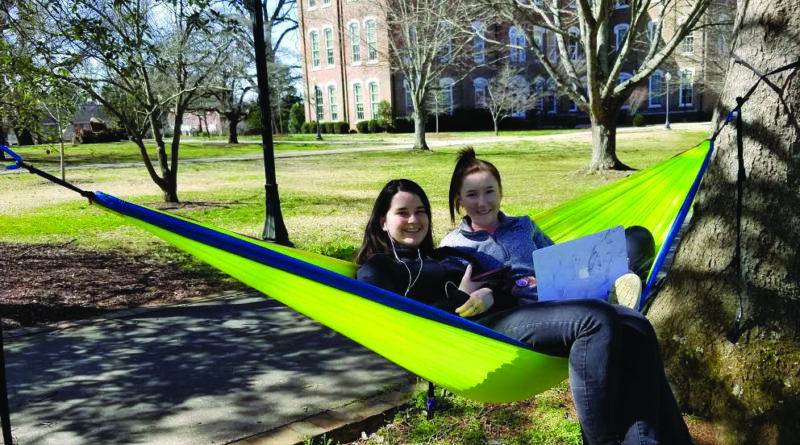A good prescription for stress is going outside
The great outdoors is calling. As sure as day follows night, March is the dawn of Spring. Plants are waking from winter slumber. Grass, shrubs, and countless other ground cover is painting the world we walk through increasingly green. Tender green buds tip the branches of trees.
Soon, leaves will uncurl to soak up the sun’s energy and serve our environment by soaking up carbon dioxide and pumping out oxygen. Animals are becoming more active as well. Squirrel, bird, groundhog, and rabbit sightings in the campus woods are increasing.
This time of year calls people to spend more time outdoors. Picnic tables and benches on campus increasingly becoming preferred places to study, read or relax. The walking trails in the campus woods are getting more traffic, and so are the trails and camping areas all over the state. It’s an annual “call to the wild” that most people experience. Spending time outdoors makes them feel better.
“I love the fact that many doctors think of the outdoors as good medicine,” said Jackie Eul, Fit, Green and Happy Projects Manager for Mountain Challenge.
“They often advise patients to go outside for 30 minutes a day, for example. Going outside and seeing lots of green helps with relaxation. Your brain has this in common with muscles; it needs rest and recovery time. With heavy course loads, reading assignments, and deadlines, eventually it’s going to fail if we don’t let it rest every now and then.”
It’s easy to trick ourselves into believing that we’re too busy to take a break. After all, we are constantly doing something. If we take time to do nothing, we might feel like we’re going to fall behind. I used to believe this, but I learned that the opposite is true. Reflection time allows you to reprioritize your activities. You might discover, as I did, that some of your busy time is actually wasted time.
“Often people are just afraid to be bored,” said Eul. “Filling our time with being busy is glorified nowadays. Sometimes that’s a
way to avoid thoughts that you need to come to terms with. Spending relaxing time camping, hiking, or just being in someplace green without constant internet interruptions can change your view 180 degrees. People tend to think more positively, more creatively and tend to be better at problem-solving after recharging their brain batteries.”
In our push-button, instant-gratification world, the thought of unplugging from the internet can be terrifying. I’ve been on hiking trips with classmates that nearly panicked when they realized we were off the grid. An uneasy silence filled the van as they stared at their not-so-smart-now phones.
They were still useful as cameras and they soon got busy snapping photos of the splendor nature offered. Eventually, I noticed many of my classmates resting, relaxing and enjoying the sights and sounds they’d have missed reading their screens. On the way back, the van was full of conversation and laughter.
Letting the mind unwind outdoors is some of the best advice over-stressed people can receive. It can be as simple as sitting on a porch or walking through a park. Relax and breathe in nature’s good medicine. It takes a little courage to put down the technology for a while and plug into nature, but you’ll be glad you did.

